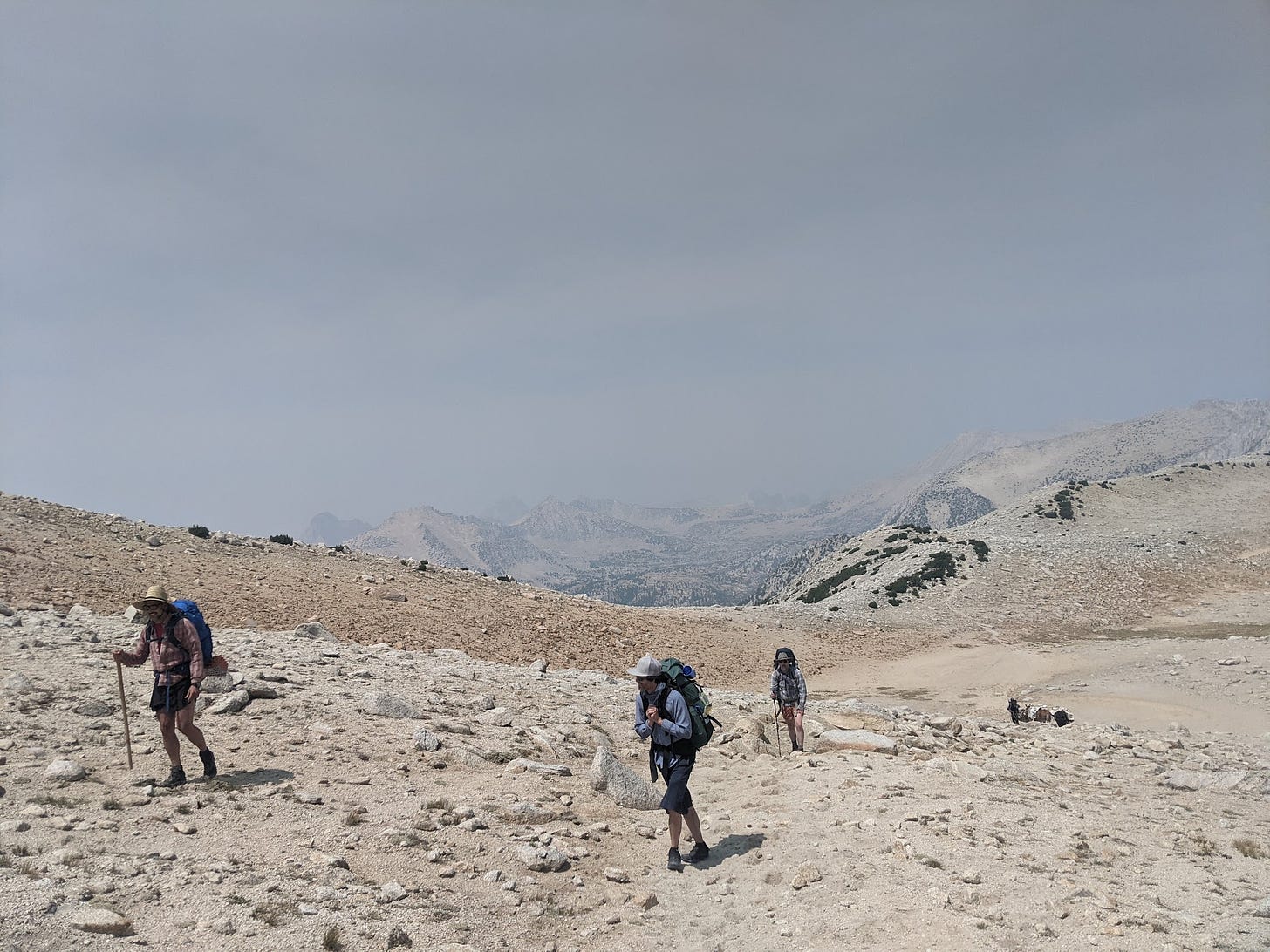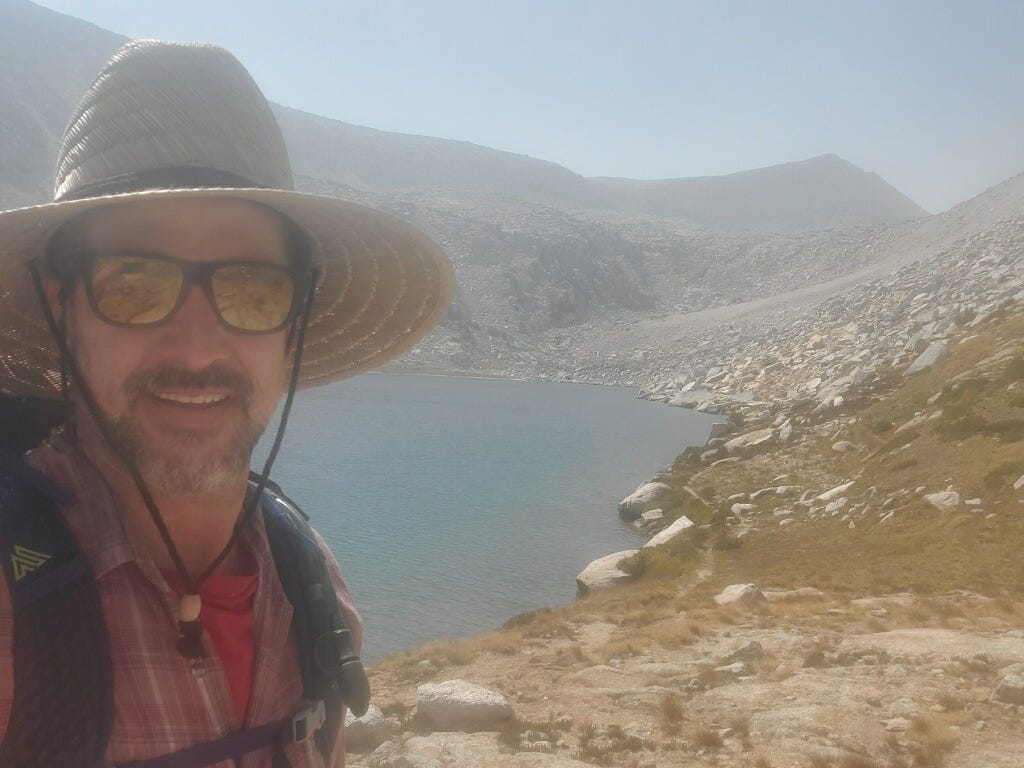This is an unlocked paid subscribers-only post.
Last week, I drove with a group of friends to the Sierra Nevada Mountains for a 3-night backpacking trip. When we left the Bay Area, the sky was grey and the sun was a little too red, but the Air Quality Index was safely in the 30s. As soon as we crossed the Altamont Pass and dipped into the Central Valley, that abruptly changed. The air everywhere smelled like we were standing next to a campfire.
That’s how things remained until we got to the Sonora Pass, crossing over the Sierras onto its eastern side. At elevation, the sky was blue. But then we dropped down into Bridgeport Valley, and the air was choked again.
We thought about turning back right then and there, but we’d picked up a hitchhiker along the way who had been on the John Muir Trail, and he told us this was the first smoke he’d seen in five days. From his report and from the cleaner air we’d breathed at the pass, we figured once we climbed a couple thousand feet we’d be in the clear. We spent a couple of hours checking AQIs on our phones, trying to guess which way the wind would blow, playing hypothetical cat-and-mouse with a natural disaster.
The clear-at-elevation theory held up for a day and a night. We climbed up to Mono Pass, at about 11,000 feet, and camped at a lake on the opposite side. It was gorgeous all day and all night. The next morning, though, we got a whiff of smoke again. We put on our packs and hiked to the far end of the lake, where there was a view into the next valley, where we’d planned on spending the second night. It looked like the Los Angeles basin in the 1980s.
We made a 180 and headed back the way we’d come in. By the time we got back to Mono Pass I was developing a headache and had never been so motivated to get the hell off a mountain.
Most of the group I went out with were old friends from high school, or even earlier. We’ve been backpacking the Sierras together for 25 years. Fall used to be our favorite time of the year to go, because it’s late enough in the season for most of the snow to be melted and for the alpine tundra to be sufficiently dried out to be inhospitable to mosquitoes. For the last few years though, that’s become a dicier proposition, as fall is the height of fire season. This year, we figured August would be a safer bet, but as climate change inches forward month by month, the fires are starting earlier and earlier. The fire whose smoke turned us back off the mountain last week was from the Dixie Fire in the northeast corner of the state. It’s the second biggest wildfire in California’s history, and it’s not even the traditional start of the fire season yet.
At middle age, I’ve lived my entire life, more or less, in one state. I was born and raised in Berkeley. I went to college in upstate New York and lived in the city for a couple of years after that, but then I came home again. I lived in San Francisco for about six years, Los Angeles for nearly twelve, and now, Oakland. There are few things in life that feel more familiar to me than the state of California.
And never before has California felt so doomed. In 2018, for the first time, we had to start donning N95 masks just to go outside. With the smoke from the Camp Fire collecting in the Sacramento Valley and then being pumped into the skies over the Bay Area like a bellows, Northern California was, for a little while, the most polluted place on earth. That was weird, but even more alarming was when it became normal. In 2019, the Kincade Fire in Sonoma County had us checking the Air Quality Index again every day, to determine whether it was safe to go outside unmasked or not. Last year, of course, we were all stranded in our homes, wearing surgical masks instead of N95s whenever we stepped out the door. I’ve been darkly curious as to whether, this year, we’ll just be trading in our pandemic masks for wildfire ones. It’s looking more and more likely.
The fires are the most overt and on-the-nose example of the unspooling of the state, but there are others. As in cities all over the country, the murder rate in my town is shooting into the stratosphere. And the homicides just feel like the tip of the spear of a more general breakdown in law and order. Last summer, my dog developed full-blown agoraphobia from the nonstop illegal fireworks that began before noon and didn’t let up until close to midnight, every day for months. To this day she mostly refuses to walk if it’s later than about ten in the morning. That may sound like a bourgeois problem to those who assume that poor people’s sensibilities are somehow cruder and less sensitive to ceaseless auditory bombardment. But it’s not just that the noise was profoundly annoying; it also felt like a harbinger of social decay, which seemed borne out by other things, like the spate of random anti-Asian street violence that was endemic in the Bay Area long before it made national news.
And then there’s the state’s politics. Never mind the gubernatorial recall election — which is crazy enough — and consider what passes as normal in California politics. Case-in-point: In 2018, the state Supreme Court ruled that the way that Uber and Lyft classify their workers as independent contractors was unconstitutional. In response, the state legislature passed a law that codified that ruling and forced the companies to abide by it. The tech industry fought back by moving a ballot referendum that invalidated the new law. Last week, the courts weighed in again, invalidating the initiative that had invalidated the law that had codified the court’s initial ruling.
I happen to be in favor of making it much harder for Uber and Lyft (fuck them) to classify their drivers as self-employed but that’s neither here nor there. The whole saga puts an exclamation point on the question that a lot of Californians wonder about all the time: who the hell governs this state?
I have a one year-old son. He was born in Berkeley, like me, in the same hospital as I was, on my mother’s birthday. I love California. I want him to as well. I want to take him to L.A. every Thanksgiving to see his family there, and make a tradition of stopping in Big Sur on the way down for a night of car camping. I want to take him to the Sierras to behold the kind of landscapes that tempt me to believe in God. But every day I wonder if I really want to raise a child in a place where we may have to wear gas masks for five months a year when we exit our houses, where all the windows are sealed shut to keep the poison out. And as a middle-aged homeowner, I’m not going to lie: I also wonder whether my property values are going to hold up when everyone starts bolting the state, which I’m starting to think is inevitable.
The wildfires encircle us, clogging the sky with soot and cancer. Most of the time, at least in the Bay, it’s fine; we’re blessed by so many things, among them the winds off the Pacific Ocean. When it’s not fine, though, they haunt our every trip to the grocery store, mocking our stupid California dreamscape fantasies and threatening the long-term health of our children. This is the reality of the pre-dystopian age we’re living through. California feels doomed. The question is: is there anywhere else that doesn’t?





I was born and spent most of my life in California. Five years ago I was beyond fed up and moved to Reno. I wish I came here 20 years ago.
But the smoke (thanks, California!). What you experienced at Mono Pass has been how we've been living 24 hours a day for most of the last two weeks. And there's no place to go to get away from it.
I enjoy your pieces because I find I agree with you on much and the things I don't agree with you on, I still find your take interesting. I am conflicted by this "abandoning" California approach for two reasons. First, California is connected to the rest of the US. We need people to stay and clean it up, not abandoned it because the rest of us are attached to it. So unless we're going to build a wall . . . or put dynamite in the fault . . .
Second, I live in Montana. People "escape" California, come here, and bring all the attitudes that made California what it is with them. Let's take as an example the wildfire situation. This has been the first smokey summer in half a decade here. I can't quite figure out how California can have so much trouble with fire due to climate change when that same climate change does not seem to affect the rest of us in the same consistent way. Montana has been dry, but we're not on fire. So what is the difference? And if the difference is a realistic attitude in Montana toward conservation of forests and an understanding that while in the old days, when people lived in caves, it was quite fine to let the whole thing burn, but now that we live, well, not in caves, we need to keep forest clean of dead trees, then I don't want the California attitude of we must leave things as they are because "natural" imported to Montana.
I enjoy your articles because often you incorporate some semblance of a solution into your pieces, and the one thing I do differ with you on is calling the recall crazy, because it is a solution. The big problem with California is that it is a one-party state (I would say something similar about any deep red state). That leads to a lack of accountability and compromise. As crazy as it is, the recall is a way to demand accountability. That's actually an idea I wouldn't mind the resettling Californians bring to Montana. Too often politicians get in office and can do whatever they want because they think people will forget by the next election, and they often do. A recall process hanging over them would counter that.